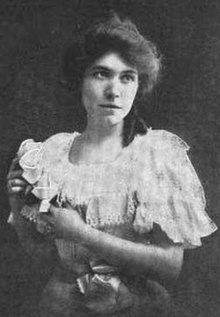| Nora Dunblane | |
|---|---|
 Nora Dunblane, from a 1900 publication Nora Dunblane, from a 1900 publication | |
| Born | 1879 New York City, New York, United States |
| Nationality | American |
| Other names | Norah Dunblane |
| Occupation(s) | actress, romance writer |

Nora Dunblane (born 1879 - fl. 1915) was an American actress and short story writer.
Early life and education
Nora Dunblane was born in Brooklyn. She attended Miss Rounds' School and the American Academy of Dramatic Arts (graduating in 1899), and was involved with the Brooklyn Cantata Club.
After graduating, she was active in the American Academy of Dramatic Arts alumni society, and served on its library committee in 1904, with elocutionist Helena Zachos.
Stage career
Dunblane was a "clever young American actress" on Broadway at the turn into the 20th century, often seen in soubrette roles. Dunblane's stage credits included roles in Cyrano de Bergerac (1898) with Richard Mansfield, Hearts are Trumps (1900), The Cuckoo (1900), Her Majesty (1900), Lovers' Lane (1901), Her Atonement (1899 and 1901), The Worst Woman in London (1903), Much Ado About Nothing (1903), His Sister's Shame (1903), and Don Carlos (1905).
In 1900, she performed in an all-star benefit at Carnegie Hall, raising funds for Roman Catholic orphanages.
Writing
Dunblane was a writer during and after her acting days. Her short fiction, often romance stories, appeared in magazines and newspapers, with titles including "The Girl in the Bookshop" (1903), "Beating the Game" (1907), "Studio Number Six: The Story of a Musician" (1907), "Romance at Ryerson's" (1908), "Two Ways of Love" (1912), "Love's Command" (1913), "Otilla's Triumph" (1914), "The White Gardenia" (1915), "The Girl Who Was Charming" (1915), and "Jasmine's Decision" (1915).
In culture
The band Tommy McClymont & The Panacea Jamband recorded a song, "Nora Dunblane", about the actress, on their album May the Ladies Treat You Kindly (2016). (McClymont is from Dunblane, Scotland, and was inspired to write the song by a photograph of the actress.)
References
- "A Brooklyn Actress" The Brooklyn Daily Eagle (December 20, 1903): 31. via Newspapers.com
- ^ "Plays and Players" Brooklyn Life (December 26, 1903): 28. via Newspapers.com
- Annual Catalogue, American Academy of Dramatic Arts and the Empire Theatre (1904): 73, 75.
- "Nora Dunblane" Broadway Magazine (December 1900): 161.
- "Nora Dunblane" The Judge (September 14, 1901): 4.
- Paul Wilstach, "Richard Mansfield" Scribner's Magazine (November 1908): 539.
- "Stage Folk" The International (April 1900): 433.
- "Nora Dunblane" The New York Clipper (March 31, 1900): 4. via Illinois Digital Newspaper Collection
- "A Stage Favorite" Wilkes-Barre Times Leader (October 22, 1900): 2. via Newspapers.com
- "An Actress of Promise" The Tri-City Herald (December 20, 1901): 1. via Newspapers.com
- "A New London Comedy" New York Times (February 12, 1899) 15. via Newspapers.com
- Thomas Allston Brown, A History of the New York Stage from the First Performance in 1732 to 1901, Volume 2 (Dodd, Mead 1903): 114.
- "Second Play as in Queen Elizabeth's Time" New York Times (February 3, 1903): 9. via ProQuest
- "The Theatres" Philadelphia Inquirer (September 6, 1903): 28. via Newspapers.com
- "At the Playhouses" Omaha Daily Bee (November 11, 1905): 6. via Newspapers.com
- "Orphan Asylums' Benefit" New York Times (November 18, 1900): 22. via ProQuest
- "Dramatic Notes" The Nebraska State Journal (March 22, 1903): 13. via Newspapers.com
- Nora Dunblane, "Beating the Game" New-York Tribune (November 10, 1907): 32. via Newspapers.com
- Nora Dunblane, "Studio Number Six: The Story of a Musician", in Alfred Ludlow White, ed., Short Stories: A Magazine of Select Fiction (November 1907): 184-192.
- Nora Dunblane, "The Romance at Ryerson's" The Lafourche Comet (March 12, 1908): 3. via Newspapers.com
- Nora Dunblane, "Two Ways of Love" The Buffalo Times (January 28, 1912): 64. via Newspapers.com
- Nora Dunblane, "Otilla's Triumph" The Woman's Magazine (June 1914): 7.
- "Literary Notes" The Wilkes-Barre Record (March 29, 1915): 14. via Newspapers.com
- Nora Dunblane, "Jasmine's Decision" The Des Moines Register (September 19, 1915): 52. via Newspapers.com